Impact of Organizational Behaviour on Marks and Spencer Performance
VerifiedAdded on 2020/07/22
|11
|4573
|138
Report
AI Summary
This report provides an in-depth analysis of the organizational behaviour within Marks and Spencer. It begins with an introduction to organizational behaviour, highlighting its importance in achieving company goals. The report is divided into two main sections. The first section examines the impact of organizational culture, politics, and power on individual and team behaviour and performance, specifically within Marks and Spencer. It discusses how these factors influence employee conduct and productivity, considering both positive and negative aspects. The second section delves into motivational theories and tools used to encourage employees, including empowerment, self-improvement, and compensation strategies. It explores motivational theories such as Maslow's hierarchy of needs and Herzberg's two-factor theory. The report concludes by emphasizing the importance of these factors in shaping employee behaviour and overall organizational success, referencing how culture, politics and power impact employee performance and the application of motivational tools in achieving organizational objectives.
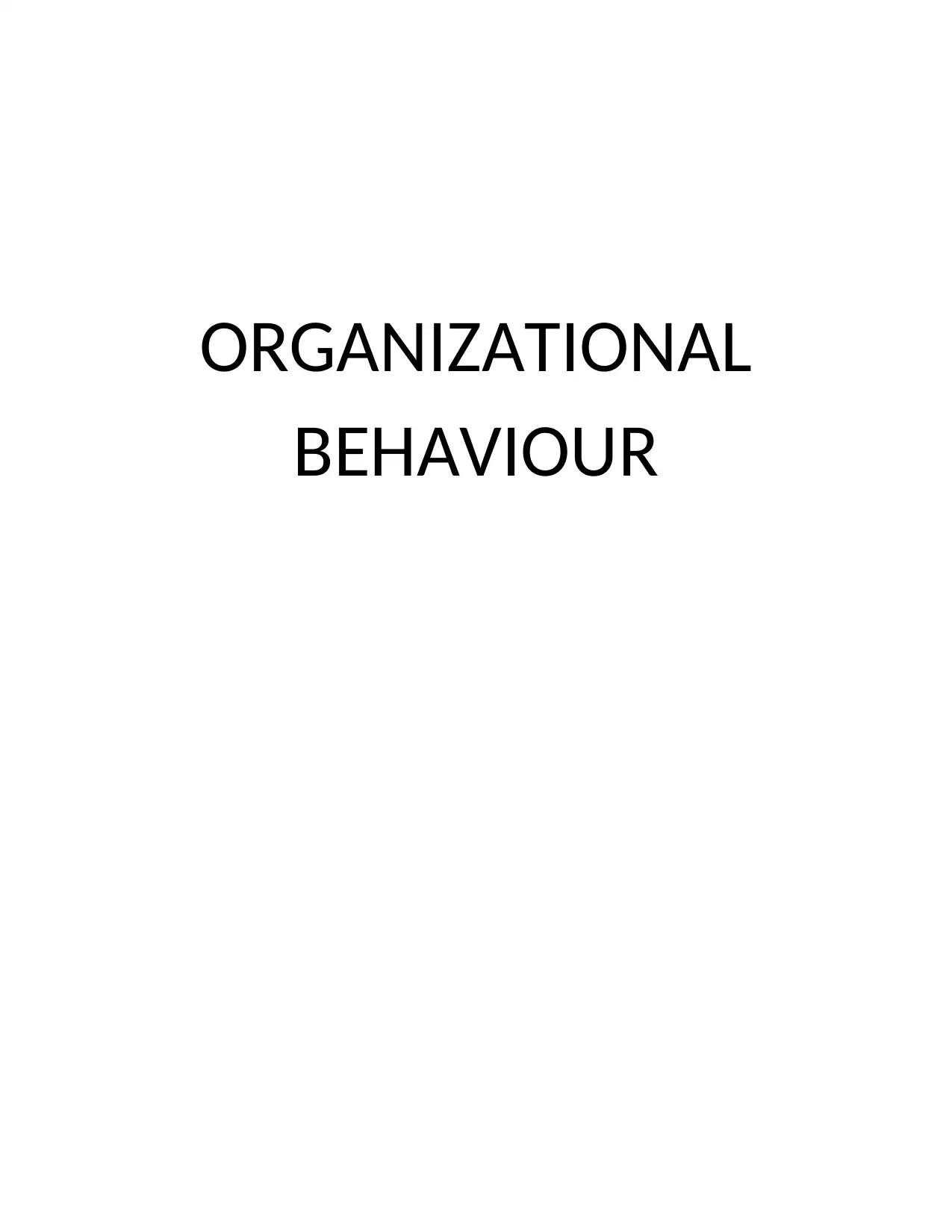
ORGANIZATIONAL
BEHAVIOUR
BEHAVIOUR
Paraphrase This Document
Need a fresh take? Get an instant paraphrase of this document with our AI Paraphraser
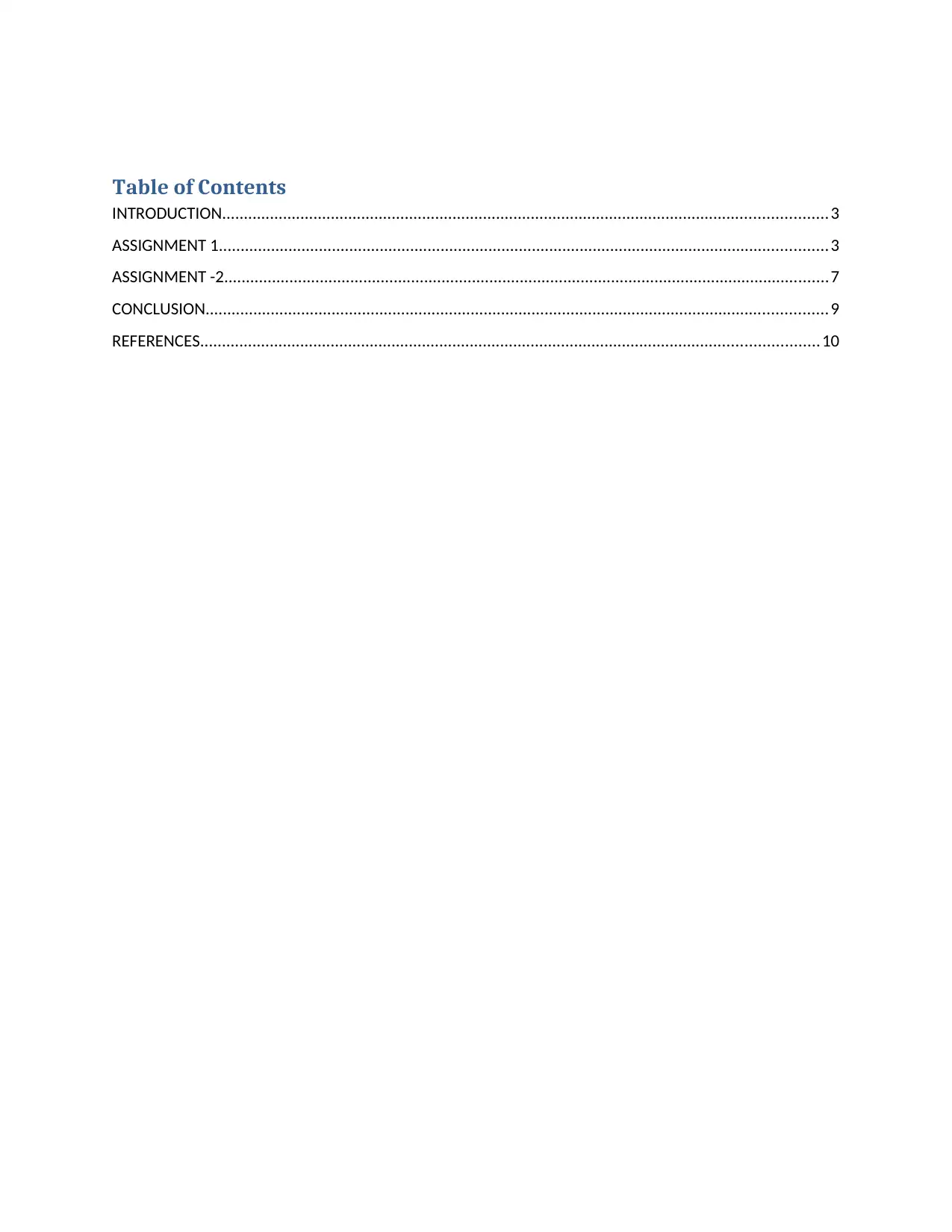
Table of Contents
INTRODUCTION...........................................................................................................................................3
ASSIGNMENT 1............................................................................................................................................3
ASSIGNMENT -2...........................................................................................................................................7
CONCLUSION...............................................................................................................................................9
REFERENCES..............................................................................................................................................10
INTRODUCTION...........................................................................................................................................3
ASSIGNMENT 1............................................................................................................................................3
ASSIGNMENT -2...........................................................................................................................................7
CONCLUSION...............................................................................................................................................9
REFERENCES..............................................................................................................................................10
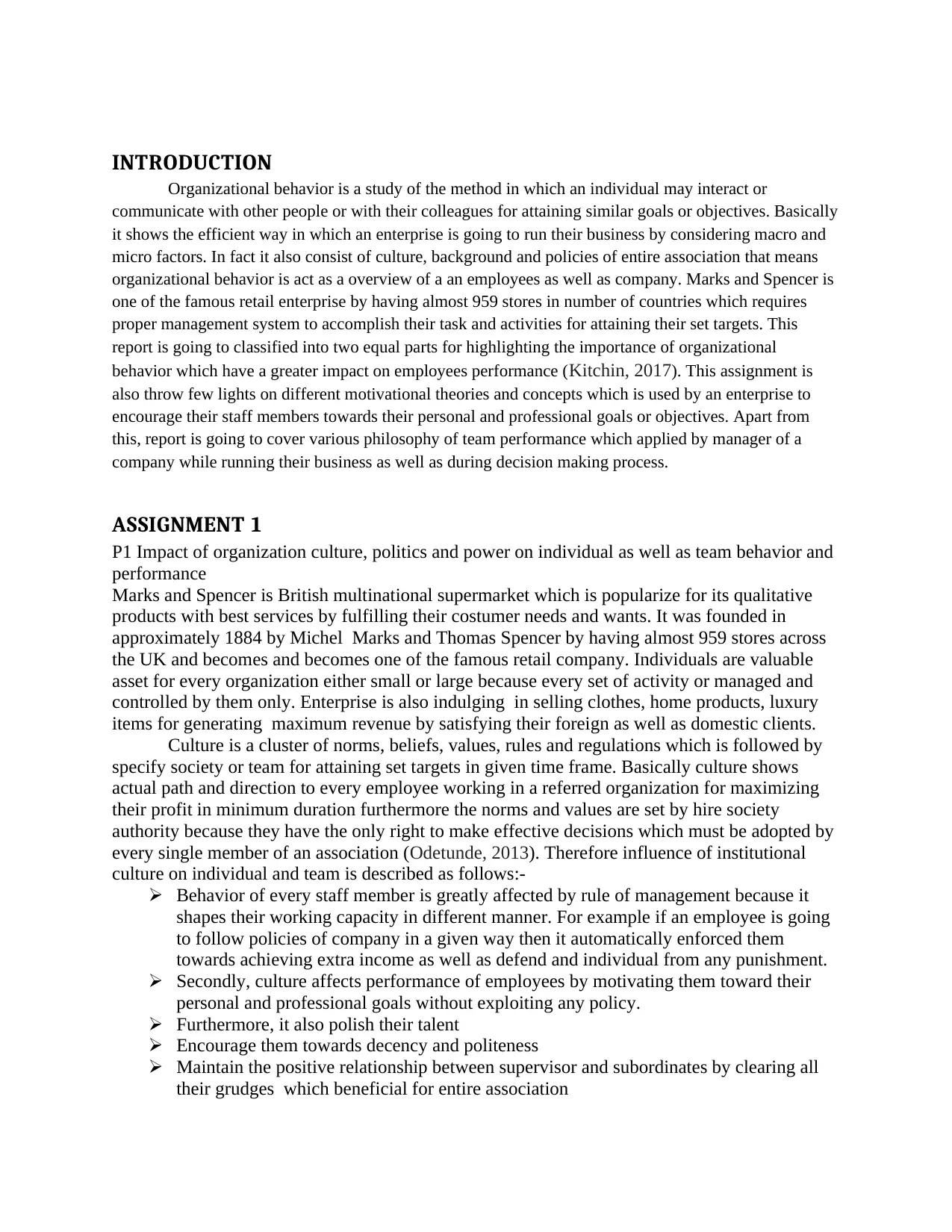
INTRODUCTION
Organizational behavior is a study of the method in which an individual may interact or
communicate with other people or with their colleagues for attaining similar goals or objectives. Basically
it shows the efficient way in which an enterprise is going to run their business by considering macro and
micro factors. In fact it also consist of culture, background and policies of entire association that means
organizational behavior is act as a overview of a an employees as well as company. Marks and Spencer is
one of the famous retail enterprise by having almost 959 stores in number of countries which requires
proper management system to accomplish their task and activities for attaining their set targets. This
report is going to classified into two equal parts for highlighting the importance of organizational
behavior which have a greater impact on employees performance (Kitchin, 2017). This assignment is
also throw few lights on different motivational theories and concepts which is used by an enterprise to
encourage their staff members towards their personal and professional goals or objectives. Apart from
this, report is going to cover various philosophy of team performance which applied by manager of a
company while running their business as well as during decision making process.
ASSIGNMENT 1
P1 Impact of organization culture, politics and power on individual as well as team behavior and
performance
Marks and Spencer is British multinational supermarket which is popularize for its qualitative
products with best services by fulfilling their costumer needs and wants. It was founded in
approximately 1884 by Michel Marks and Thomas Spencer by having almost 959 stores across
the UK and becomes and becomes one of the famous retail company. Individuals are valuable
asset for every organization either small or large because every set of activity or managed and
controlled by them only. Enterprise is also indulging in selling clothes, home products, luxury
items for generating maximum revenue by satisfying their foreign as well as domestic clients.
Culture is a cluster of norms, beliefs, values, rules and regulations which is followed by
specify society or team for attaining set targets in given time frame. Basically culture shows
actual path and direction to every employee working in a referred organization for maximizing
their profit in minimum duration furthermore the norms and values are set by hire society
authority because they have the only right to make effective decisions which must be adopted by
every single member of an association (Odetunde, 2013). Therefore influence of institutional
culture on individual and team is described as follows:-
Behavior of every staff member is greatly affected by rule of management because it
shapes their working capacity in different manner. For example if an employee is going
to follow policies of company in a given way then it automatically enforced them
towards achieving extra income as well as defend and individual from any punishment.
Secondly, culture affects performance of employees by motivating them toward their
personal and professional goals without exploiting any policy.
Furthermore, it also polish their talent
Encourage them towards decency and politeness
Maintain the positive relationship between supervisor and subordinates by clearing all
their grudges which beneficial for entire association
Organizational behavior is a study of the method in which an individual may interact or
communicate with other people or with their colleagues for attaining similar goals or objectives. Basically
it shows the efficient way in which an enterprise is going to run their business by considering macro and
micro factors. In fact it also consist of culture, background and policies of entire association that means
organizational behavior is act as a overview of a an employees as well as company. Marks and Spencer is
one of the famous retail enterprise by having almost 959 stores in number of countries which requires
proper management system to accomplish their task and activities for attaining their set targets. This
report is going to classified into two equal parts for highlighting the importance of organizational
behavior which have a greater impact on employees performance (Kitchin, 2017). This assignment is
also throw few lights on different motivational theories and concepts which is used by an enterprise to
encourage their staff members towards their personal and professional goals or objectives. Apart from
this, report is going to cover various philosophy of team performance which applied by manager of a
company while running their business as well as during decision making process.
ASSIGNMENT 1
P1 Impact of organization culture, politics and power on individual as well as team behavior and
performance
Marks and Spencer is British multinational supermarket which is popularize for its qualitative
products with best services by fulfilling their costumer needs and wants. It was founded in
approximately 1884 by Michel Marks and Thomas Spencer by having almost 959 stores across
the UK and becomes and becomes one of the famous retail company. Individuals are valuable
asset for every organization either small or large because every set of activity or managed and
controlled by them only. Enterprise is also indulging in selling clothes, home products, luxury
items for generating maximum revenue by satisfying their foreign as well as domestic clients.
Culture is a cluster of norms, beliefs, values, rules and regulations which is followed by
specify society or team for attaining set targets in given time frame. Basically culture shows
actual path and direction to every employee working in a referred organization for maximizing
their profit in minimum duration furthermore the norms and values are set by hire society
authority because they have the only right to make effective decisions which must be adopted by
every single member of an association (Odetunde, 2013). Therefore influence of institutional
culture on individual and team is described as follows:-
Behavior of every staff member is greatly affected by rule of management because it
shapes their working capacity in different manner. For example if an employee is going
to follow policies of company in a given way then it automatically enforced them
towards achieving extra income as well as defend and individual from any punishment.
Secondly, culture affects performance of employees by motivating them toward their
personal and professional goals without exploiting any policy.
Furthermore, it also polish their talent
Encourage them towards decency and politeness
Maintain the positive relationship between supervisor and subordinates by clearing all
their grudges which beneficial for entire association
⊘ This is a preview!⊘
Do you want full access?
Subscribe today to unlock all pages.

Trusted by 1+ million students worldwide
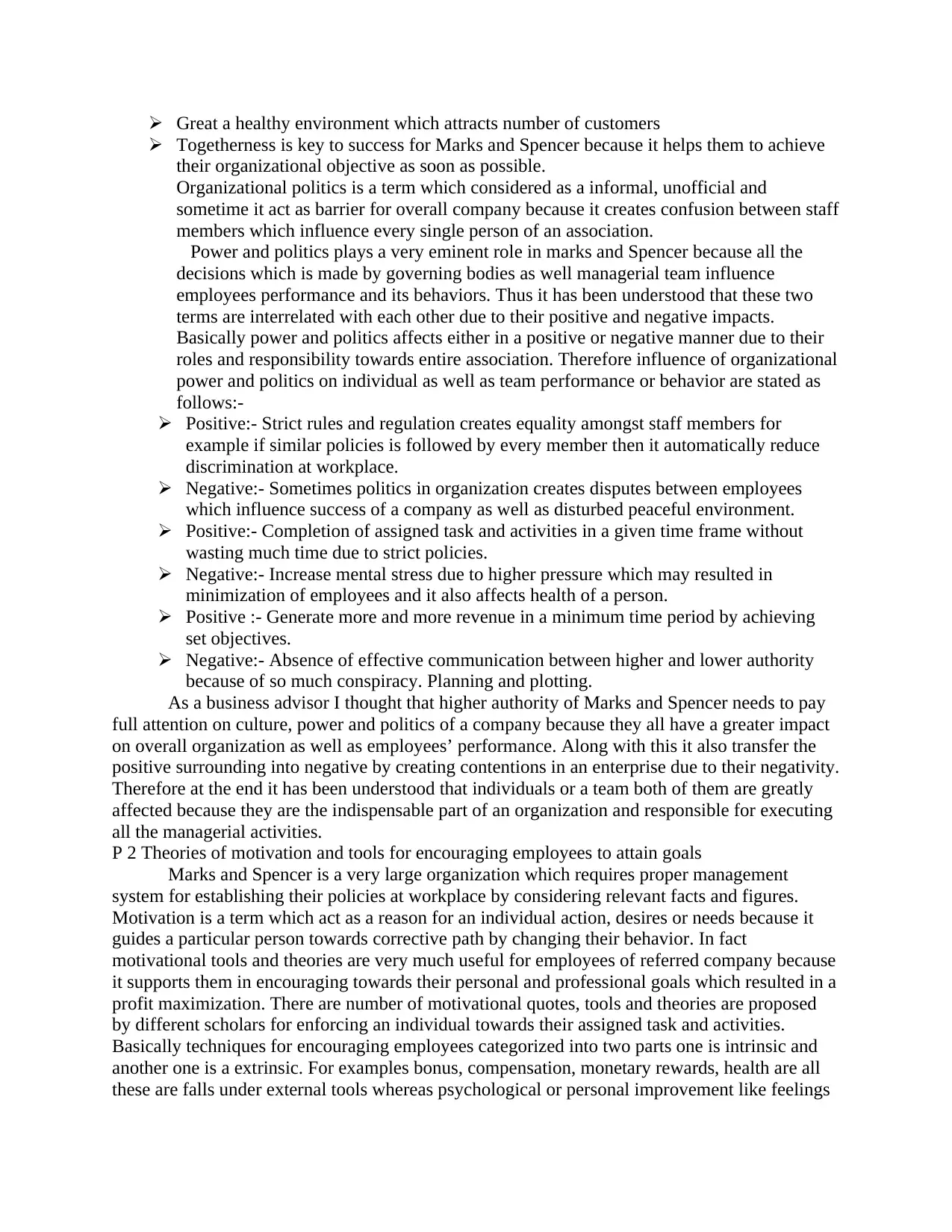
Great a healthy environment which attracts number of customers
Togetherness is key to success for Marks and Spencer because it helps them to achieve
their organizational objective as soon as possible.
Organizational politics is a term which considered as a informal, unofficial and
sometime it act as barrier for overall company because it creates confusion between staff
members which influence every single person of an association.
Power and politics plays a very eminent role in marks and Spencer because all the
decisions which is made by governing bodies as well managerial team influence
employees performance and its behaviors. Thus it has been understood that these two
terms are interrelated with each other due to their positive and negative impacts.
Basically power and politics affects either in a positive or negative manner due to their
roles and responsibility towards entire association. Therefore influence of organizational
power and politics on individual as well as team performance or behavior are stated as
follows:-
Positive:- Strict rules and regulation creates equality amongst staff members for
example if similar policies is followed by every member then it automatically reduce
discrimination at workplace.
Negative:- Sometimes politics in organization creates disputes between employees
which influence success of a company as well as disturbed peaceful environment.
Positive:- Completion of assigned task and activities in a given time frame without
wasting much time due to strict policies.
Negative:- Increase mental stress due to higher pressure which may resulted in
minimization of employees and it also affects health of a person.
Positive :- Generate more and more revenue in a minimum time period by achieving
set objectives.
Negative:- Absence of effective communication between higher and lower authority
because of so much conspiracy. Planning and plotting.
As a business advisor I thought that higher authority of Marks and Spencer needs to pay
full attention on culture, power and politics of a company because they all have a greater impact
on overall organization as well as employees’ performance. Along with this it also transfer the
positive surrounding into negative by creating contentions in an enterprise due to their negativity.
Therefore at the end it has been understood that individuals or a team both of them are greatly
affected because they are the indispensable part of an organization and responsible for executing
all the managerial activities.
P 2 Theories of motivation and tools for encouraging employees to attain goals
Marks and Spencer is a very large organization which requires proper management
system for establishing their policies at workplace by considering relevant facts and figures.
Motivation is a term which act as a reason for an individual action, desires or needs because it
guides a particular person towards corrective path by changing their behavior. In fact
motivational tools and theories are very much useful for employees of referred company because
it supports them in encouraging towards their personal and professional goals which resulted in a
profit maximization. There are number of motivational quotes, tools and theories are proposed
by different scholars for enforcing an individual towards their assigned task and activities.
Basically techniques for encouraging employees categorized into two parts one is intrinsic and
another one is a extrinsic. For examples bonus, compensation, monetary rewards, health are all
these are falls under external tools whereas psychological or personal improvement like feelings
Togetherness is key to success for Marks and Spencer because it helps them to achieve
their organizational objective as soon as possible.
Organizational politics is a term which considered as a informal, unofficial and
sometime it act as barrier for overall company because it creates confusion between staff
members which influence every single person of an association.
Power and politics plays a very eminent role in marks and Spencer because all the
decisions which is made by governing bodies as well managerial team influence
employees performance and its behaviors. Thus it has been understood that these two
terms are interrelated with each other due to their positive and negative impacts.
Basically power and politics affects either in a positive or negative manner due to their
roles and responsibility towards entire association. Therefore influence of organizational
power and politics on individual as well as team performance or behavior are stated as
follows:-
Positive:- Strict rules and regulation creates equality amongst staff members for
example if similar policies is followed by every member then it automatically reduce
discrimination at workplace.
Negative:- Sometimes politics in organization creates disputes between employees
which influence success of a company as well as disturbed peaceful environment.
Positive:- Completion of assigned task and activities in a given time frame without
wasting much time due to strict policies.
Negative:- Increase mental stress due to higher pressure which may resulted in
minimization of employees and it also affects health of a person.
Positive :- Generate more and more revenue in a minimum time period by achieving
set objectives.
Negative:- Absence of effective communication between higher and lower authority
because of so much conspiracy. Planning and plotting.
As a business advisor I thought that higher authority of Marks and Spencer needs to pay
full attention on culture, power and politics of a company because they all have a greater impact
on overall organization as well as employees’ performance. Along with this it also transfer the
positive surrounding into negative by creating contentions in an enterprise due to their negativity.
Therefore at the end it has been understood that individuals or a team both of them are greatly
affected because they are the indispensable part of an organization and responsible for executing
all the managerial activities.
P 2 Theories of motivation and tools for encouraging employees to attain goals
Marks and Spencer is a very large organization which requires proper management
system for establishing their policies at workplace by considering relevant facts and figures.
Motivation is a term which act as a reason for an individual action, desires or needs because it
guides a particular person towards corrective path by changing their behavior. In fact
motivational tools and theories are very much useful for employees of referred company because
it supports them in encouraging towards their personal and professional goals which resulted in a
profit maximization. There are number of motivational quotes, tools and theories are proposed
by different scholars for enforcing an individual towards their assigned task and activities.
Basically techniques for encouraging employees categorized into two parts one is intrinsic and
another one is a extrinsic. For examples bonus, compensation, monetary rewards, health are all
these are falls under external tools whereas psychological or personal improvement like feelings
Paraphrase This Document
Need a fresh take? Get an instant paraphrase of this document with our AI Paraphraser
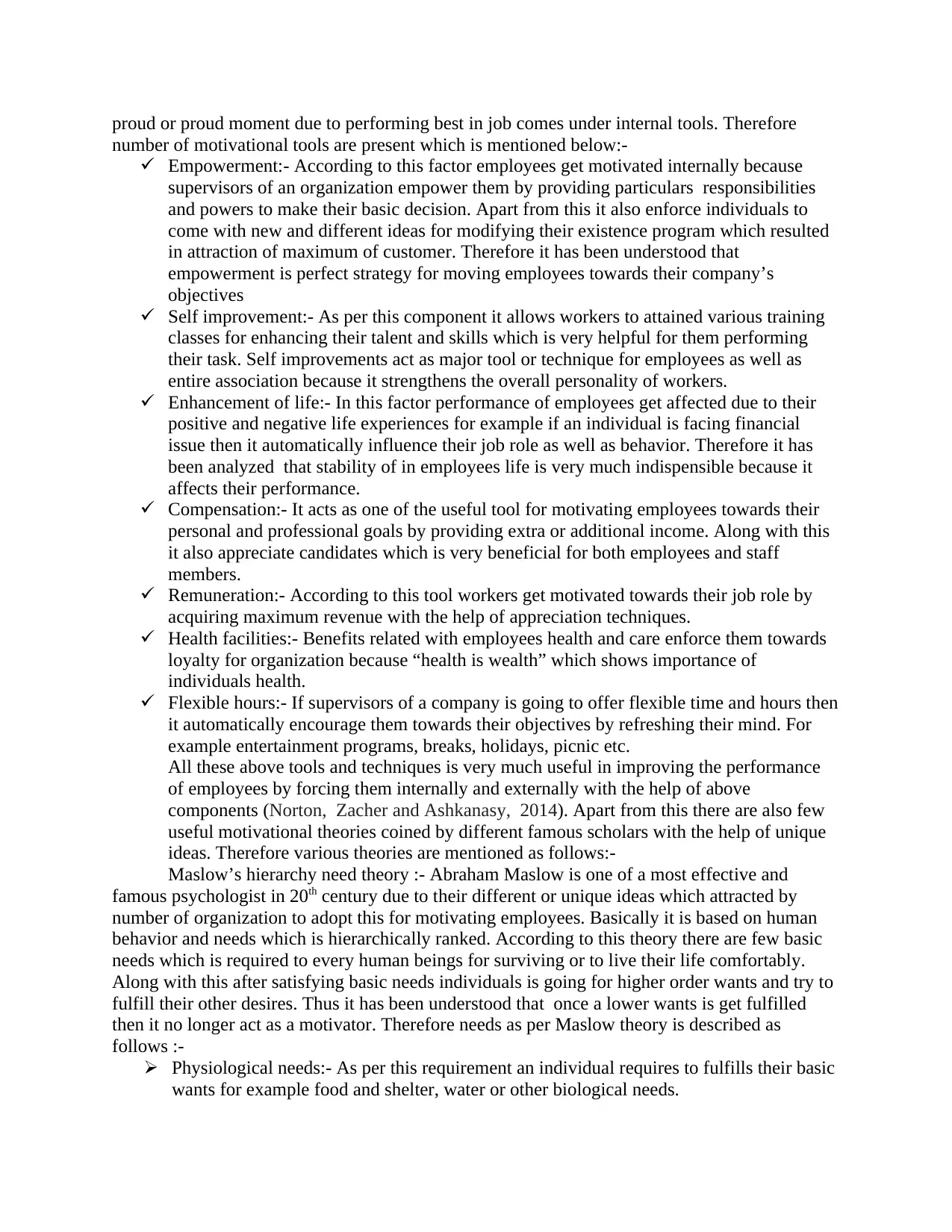
proud or proud moment due to performing best in job comes under internal tools. Therefore
number of motivational tools are present which is mentioned below:-
Empowerment:- According to this factor employees get motivated internally because
supervisors of an organization empower them by providing particulars responsibilities
and powers to make their basic decision. Apart from this it also enforce individuals to
come with new and different ideas for modifying their existence program which resulted
in attraction of maximum of customer. Therefore it has been understood that
empowerment is perfect strategy for moving employees towards their company’s
objectives
Self improvement:- As per this component it allows workers to attained various training
classes for enhancing their talent and skills which is very helpful for them performing
their task. Self improvements act as major tool or technique for employees as well as
entire association because it strengthens the overall personality of workers.
Enhancement of life:- In this factor performance of employees get affected due to their
positive and negative life experiences for example if an individual is facing financial
issue then it automatically influence their job role as well as behavior. Therefore it has
been analyzed that stability of in employees life is very much indispensible because it
affects their performance.
Compensation:- It acts as one of the useful tool for motivating employees towards their
personal and professional goals by providing extra or additional income. Along with this
it also appreciate candidates which is very beneficial for both employees and staff
members.
Remuneration:- According to this tool workers get motivated towards their job role by
acquiring maximum revenue with the help of appreciation techniques.
Health facilities:- Benefits related with employees health and care enforce them towards
loyalty for organization because “health is wealth” which shows importance of
individuals health.
Flexible hours:- If supervisors of a company is going to offer flexible time and hours then
it automatically encourage them towards their objectives by refreshing their mind. For
example entertainment programs, breaks, holidays, picnic etc.
All these above tools and techniques is very much useful in improving the performance
of employees by forcing them internally and externally with the help of above
components (Norton, Zacher and Ashkanasy, 2014). Apart from this there are also few
useful motivational theories coined by different famous scholars with the help of unique
ideas. Therefore various theories are mentioned as follows:-
Maslow’s hierarchy need theory :- Abraham Maslow is one of a most effective and
famous psychologist in 20th century due to their different or unique ideas which attracted by
number of organization to adopt this for motivating employees. Basically it is based on human
behavior and needs which is hierarchically ranked. According to this theory there are few basic
needs which is required to every human beings for surviving or to live their life comfortably.
Along with this after satisfying basic needs individuals is going for higher order wants and try to
fulfill their other desires. Thus it has been understood that once a lower wants is get fulfilled
then it no longer act as a motivator. Therefore needs as per Maslow theory is described as
follows :-
Physiological needs:- As per this requirement an individual requires to fulfills their basic
wants for example food and shelter, water or other biological needs.
number of motivational tools are present which is mentioned below:-
Empowerment:- According to this factor employees get motivated internally because
supervisors of an organization empower them by providing particulars responsibilities
and powers to make their basic decision. Apart from this it also enforce individuals to
come with new and different ideas for modifying their existence program which resulted
in attraction of maximum of customer. Therefore it has been understood that
empowerment is perfect strategy for moving employees towards their company’s
objectives
Self improvement:- As per this component it allows workers to attained various training
classes for enhancing their talent and skills which is very helpful for them performing
their task. Self improvements act as major tool or technique for employees as well as
entire association because it strengthens the overall personality of workers.
Enhancement of life:- In this factor performance of employees get affected due to their
positive and negative life experiences for example if an individual is facing financial
issue then it automatically influence their job role as well as behavior. Therefore it has
been analyzed that stability of in employees life is very much indispensible because it
affects their performance.
Compensation:- It acts as one of the useful tool for motivating employees towards their
personal and professional goals by providing extra or additional income. Along with this
it also appreciate candidates which is very beneficial for both employees and staff
members.
Remuneration:- According to this tool workers get motivated towards their job role by
acquiring maximum revenue with the help of appreciation techniques.
Health facilities:- Benefits related with employees health and care enforce them towards
loyalty for organization because “health is wealth” which shows importance of
individuals health.
Flexible hours:- If supervisors of a company is going to offer flexible time and hours then
it automatically encourage them towards their objectives by refreshing their mind. For
example entertainment programs, breaks, holidays, picnic etc.
All these above tools and techniques is very much useful in improving the performance
of employees by forcing them internally and externally with the help of above
components (Norton, Zacher and Ashkanasy, 2014). Apart from this there are also few
useful motivational theories coined by different famous scholars with the help of unique
ideas. Therefore various theories are mentioned as follows:-
Maslow’s hierarchy need theory :- Abraham Maslow is one of a most effective and
famous psychologist in 20th century due to their different or unique ideas which attracted by
number of organization to adopt this for motivating employees. Basically it is based on human
behavior and needs which is hierarchically ranked. According to this theory there are few basic
needs which is required to every human beings for surviving or to live their life comfortably.
Along with this after satisfying basic needs individuals is going for higher order wants and try to
fulfill their other desires. Thus it has been understood that once a lower wants is get fulfilled
then it no longer act as a motivator. Therefore needs as per Maslow theory is described as
follows :-
Physiological needs:- As per this requirement an individual requires to fulfills their basic
wants for example food and shelter, water or other biological needs.
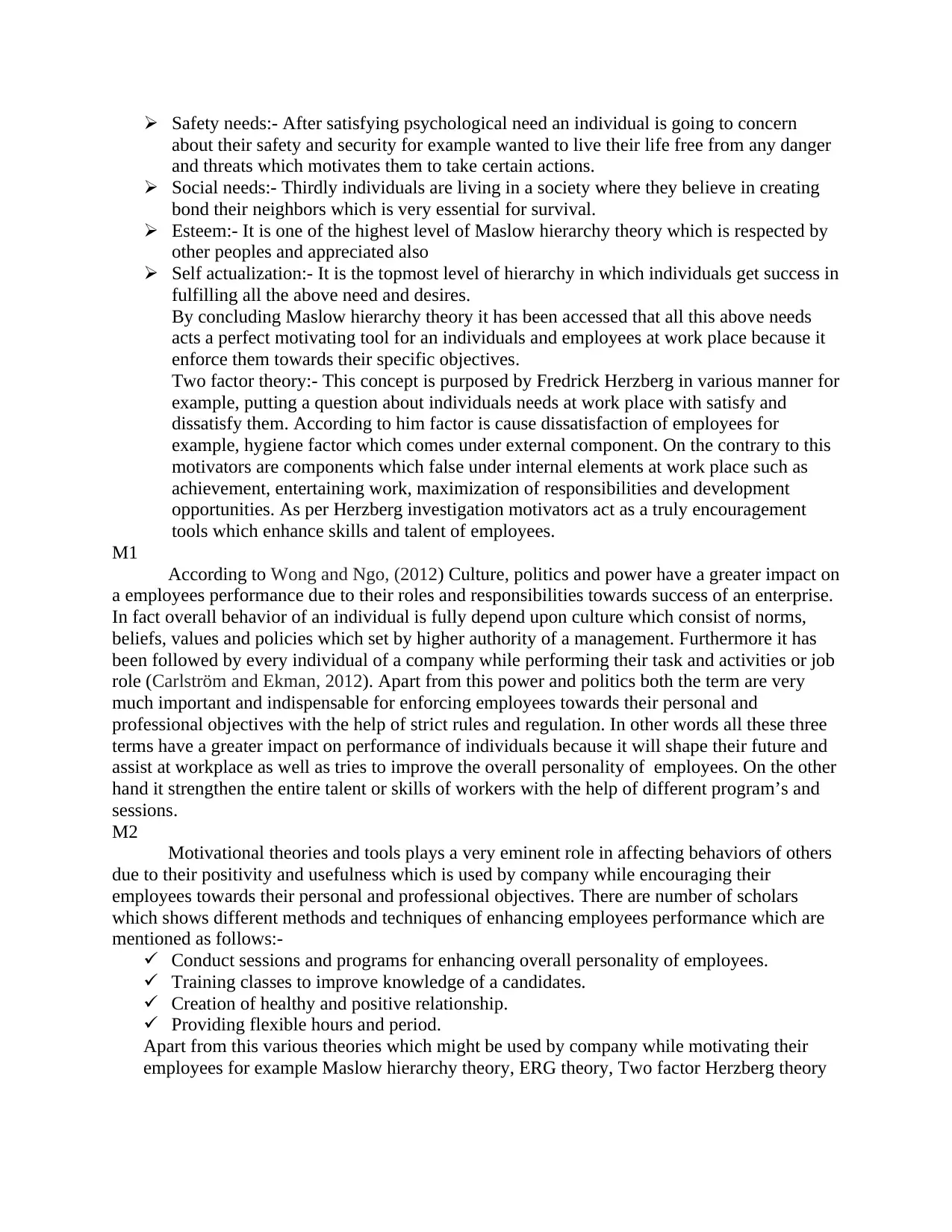
Safety needs:- After satisfying psychological need an individual is going to concern
about their safety and security for example wanted to live their life free from any danger
and threats which motivates them to take certain actions.
Social needs:- Thirdly individuals are living in a society where they believe in creating
bond their neighbors which is very essential for survival.
Esteem:- It is one of the highest level of Maslow hierarchy theory which is respected by
other peoples and appreciated also
Self actualization:- It is the topmost level of hierarchy in which individuals get success in
fulfilling all the above need and desires.
By concluding Maslow hierarchy theory it has been accessed that all this above needs
acts a perfect motivating tool for an individuals and employees at work place because it
enforce them towards their specific objectives.
Two factor theory:- This concept is purposed by Fredrick Herzberg in various manner for
example, putting a question about individuals needs at work place with satisfy and
dissatisfy them. According to him factor is cause dissatisfaction of employees for
example, hygiene factor which comes under external component. On the contrary to this
motivators are components which false under internal elements at work place such as
achievement, entertaining work, maximization of responsibilities and development
opportunities. As per Herzberg investigation motivators act as a truly encouragement
tools which enhance skills and talent of employees.
M1
According to Wong and Ngo, (2012) Culture, politics and power have a greater impact on
a employees performance due to their roles and responsibilities towards success of an enterprise.
In fact overall behavior of an individual is fully depend upon culture which consist of norms,
beliefs, values and policies which set by higher authority of a management. Furthermore it has
been followed by every individual of a company while performing their task and activities or job
role (Carlström and Ekman, 2012). Apart from this power and politics both the term are very
much important and indispensable for enforcing employees towards their personal and
professional objectives with the help of strict rules and regulation. In other words all these three
terms have a greater impact on performance of individuals because it will shape their future and
assist at workplace as well as tries to improve the overall personality of employees. On the other
hand it strengthen the entire talent or skills of workers with the help of different program’s and
sessions.
M2
Motivational theories and tools plays a very eminent role in affecting behaviors of others
due to their positivity and usefulness which is used by company while encouraging their
employees towards their personal and professional objectives. There are number of scholars
which shows different methods and techniques of enhancing employees performance which are
mentioned as follows:-
Conduct sessions and programs for enhancing overall personality of employees.
Training classes to improve knowledge of a candidates.
Creation of healthy and positive relationship.
Providing flexible hours and period.
Apart from this various theories which might be used by company while motivating their
employees for example Maslow hierarchy theory, ERG theory, Two factor Herzberg theory
about their safety and security for example wanted to live their life free from any danger
and threats which motivates them to take certain actions.
Social needs:- Thirdly individuals are living in a society where they believe in creating
bond their neighbors which is very essential for survival.
Esteem:- It is one of the highest level of Maslow hierarchy theory which is respected by
other peoples and appreciated also
Self actualization:- It is the topmost level of hierarchy in which individuals get success in
fulfilling all the above need and desires.
By concluding Maslow hierarchy theory it has been accessed that all this above needs
acts a perfect motivating tool for an individuals and employees at work place because it
enforce them towards their specific objectives.
Two factor theory:- This concept is purposed by Fredrick Herzberg in various manner for
example, putting a question about individuals needs at work place with satisfy and
dissatisfy them. According to him factor is cause dissatisfaction of employees for
example, hygiene factor which comes under external component. On the contrary to this
motivators are components which false under internal elements at work place such as
achievement, entertaining work, maximization of responsibilities and development
opportunities. As per Herzberg investigation motivators act as a truly encouragement
tools which enhance skills and talent of employees.
M1
According to Wong and Ngo, (2012) Culture, politics and power have a greater impact on
a employees performance due to their roles and responsibilities towards success of an enterprise.
In fact overall behavior of an individual is fully depend upon culture which consist of norms,
beliefs, values and policies which set by higher authority of a management. Furthermore it has
been followed by every individual of a company while performing their task and activities or job
role (Carlström and Ekman, 2012). Apart from this power and politics both the term are very
much important and indispensable for enforcing employees towards their personal and
professional objectives with the help of strict rules and regulation. In other words all these three
terms have a greater impact on performance of individuals because it will shape their future and
assist at workplace as well as tries to improve the overall personality of employees. On the other
hand it strengthen the entire talent or skills of workers with the help of different program’s and
sessions.
M2
Motivational theories and tools plays a very eminent role in affecting behaviors of others
due to their positivity and usefulness which is used by company while encouraging their
employees towards their personal and professional objectives. There are number of scholars
which shows different methods and techniques of enhancing employees performance which are
mentioned as follows:-
Conduct sessions and programs for enhancing overall personality of employees.
Training classes to improve knowledge of a candidates.
Creation of healthy and positive relationship.
Providing flexible hours and period.
Apart from this various theories which might be used by company while motivating their
employees for example Maslow hierarchy theory, ERG theory, Two factor Herzberg theory
⊘ This is a preview!⊘
Do you want full access?
Subscribe today to unlock all pages.

Trusted by 1+ million students worldwide
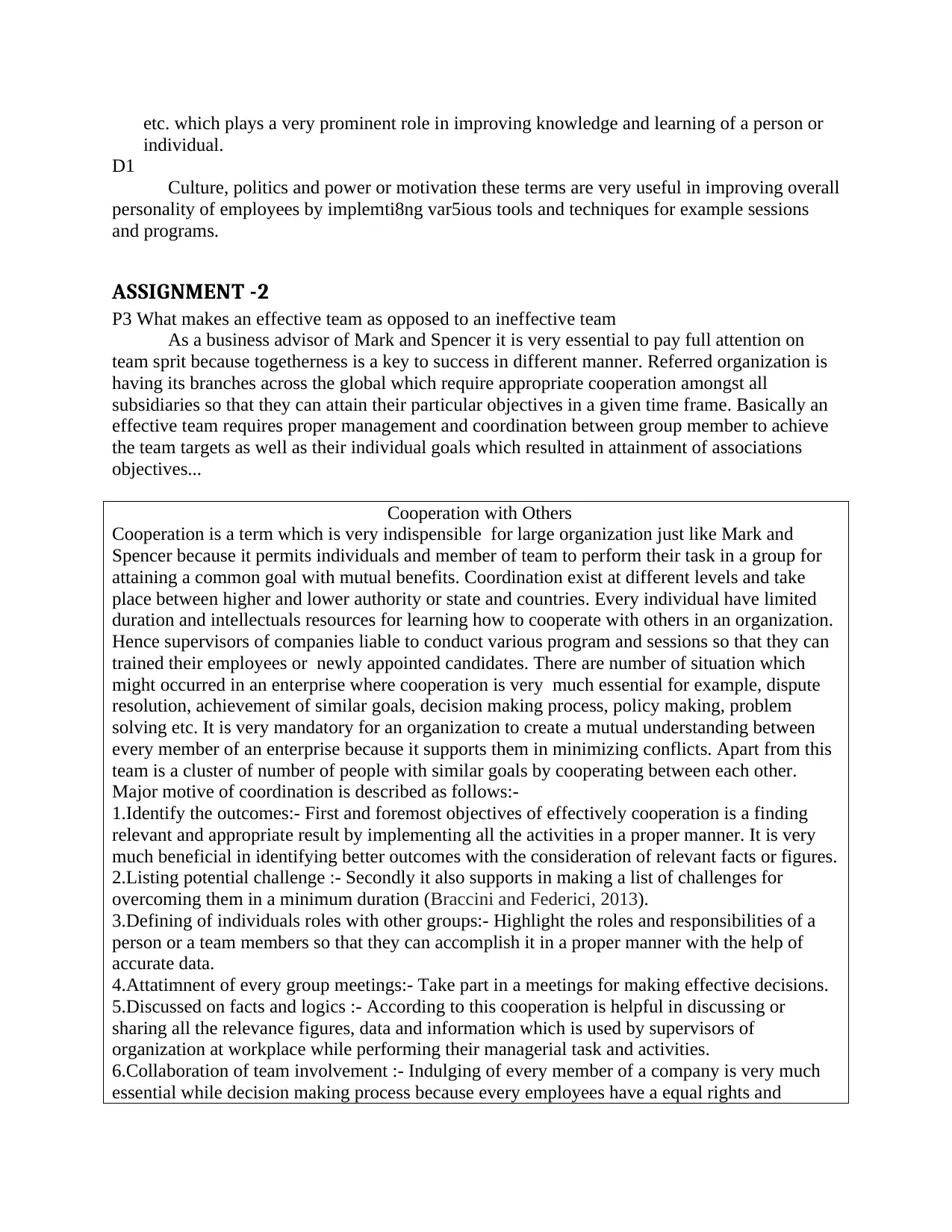
etc. which plays a very prominent role in improving knowledge and learning of a person or
individual.
D1
Culture, politics and power or motivation these terms are very useful in improving overall
personality of employees by implemti8ng var5ious tools and techniques for example sessions
and programs.
ASSIGNMENT -2
P3 What makes an effective team as opposed to an ineffective team
As a business advisor of Mark and Spencer it is very essential to pay full attention on
team sprit because togetherness is a key to success in different manner. Referred organization is
having its branches across the global which require appropriate cooperation amongst all
subsidiaries so that they can attain their particular objectives in a given time frame. Basically an
effective team requires proper management and coordination between group member to achieve
the team targets as well as their individual goals which resulted in attainment of associations
objectives...
Cooperation with Others
Cooperation is a term which is very indispensible for large organization just like Mark and
Spencer because it permits individuals and member of team to perform their task in a group for
attaining a common goal with mutual benefits. Coordination exist at different levels and take
place between higher and lower authority or state and countries. Every individual have limited
duration and intellectuals resources for learning how to cooperate with others in an organization.
Hence supervisors of companies liable to conduct various program and sessions so that they can
trained their employees or newly appointed candidates. There are number of situation which
might occurred in an enterprise where cooperation is very much essential for example, dispute
resolution, achievement of similar goals, decision making process, policy making, problem
solving etc. It is very mandatory for an organization to create a mutual understanding between
every member of an enterprise because it supports them in minimizing conflicts. Apart from this
team is a cluster of number of people with similar goals by cooperating between each other.
Major motive of coordination is described as follows:-
1.Identify the outcomes:- First and foremost objectives of effectively cooperation is a finding
relevant and appropriate result by implementing all the activities in a proper manner. It is very
much beneficial in identifying better outcomes with the consideration of relevant facts or figures.
2.Listing potential challenge :- Secondly it also supports in making a list of challenges for
overcoming them in a minimum duration (Braccini and Federici, 2013).
3.Defining of individuals roles with other groups:- Highlight the roles and responsibilities of a
person or a team members so that they can accomplish it in a proper manner with the help of
accurate data.
4.Attatimnent of every group meetings:- Take part in a meetings for making effective decisions.
5.Discussed on facts and logics :- According to this cooperation is helpful in discussing or
sharing all the relevance figures, data and information which is used by supervisors of
organization at workplace while performing their managerial task and activities.
6.Collaboration of team involvement :- Indulging of every member of a company is very much
essential while decision making process because every employees have a equal rights and
individual.
D1
Culture, politics and power or motivation these terms are very useful in improving overall
personality of employees by implemti8ng var5ious tools and techniques for example sessions
and programs.
ASSIGNMENT -2
P3 What makes an effective team as opposed to an ineffective team
As a business advisor of Mark and Spencer it is very essential to pay full attention on
team sprit because togetherness is a key to success in different manner. Referred organization is
having its branches across the global which require appropriate cooperation amongst all
subsidiaries so that they can attain their particular objectives in a given time frame. Basically an
effective team requires proper management and coordination between group member to achieve
the team targets as well as their individual goals which resulted in attainment of associations
objectives...
Cooperation with Others
Cooperation is a term which is very indispensible for large organization just like Mark and
Spencer because it permits individuals and member of team to perform their task in a group for
attaining a common goal with mutual benefits. Coordination exist at different levels and take
place between higher and lower authority or state and countries. Every individual have limited
duration and intellectuals resources for learning how to cooperate with others in an organization.
Hence supervisors of companies liable to conduct various program and sessions so that they can
trained their employees or newly appointed candidates. There are number of situation which
might occurred in an enterprise where cooperation is very much essential for example, dispute
resolution, achievement of similar goals, decision making process, policy making, problem
solving etc. It is very mandatory for an organization to create a mutual understanding between
every member of an enterprise because it supports them in minimizing conflicts. Apart from this
team is a cluster of number of people with similar goals by cooperating between each other.
Major motive of coordination is described as follows:-
1.Identify the outcomes:- First and foremost objectives of effectively cooperation is a finding
relevant and appropriate result by implementing all the activities in a proper manner. It is very
much beneficial in identifying better outcomes with the consideration of relevant facts or figures.
2.Listing potential challenge :- Secondly it also supports in making a list of challenges for
overcoming them in a minimum duration (Braccini and Federici, 2013).
3.Defining of individuals roles with other groups:- Highlight the roles and responsibilities of a
person or a team members so that they can accomplish it in a proper manner with the help of
accurate data.
4.Attatimnent of every group meetings:- Take part in a meetings for making effective decisions.
5.Discussed on facts and logics :- According to this cooperation is helpful in discussing or
sharing all the relevance figures, data and information which is used by supervisors of
organization at workplace while performing their managerial task and activities.
6.Collaboration of team involvement :- Indulging of every member of a company is very much
essential while decision making process because every employees have a equal rights and
Paraphrase This Document
Need a fresh take? Get an instant paraphrase of this document with our AI Paraphraser
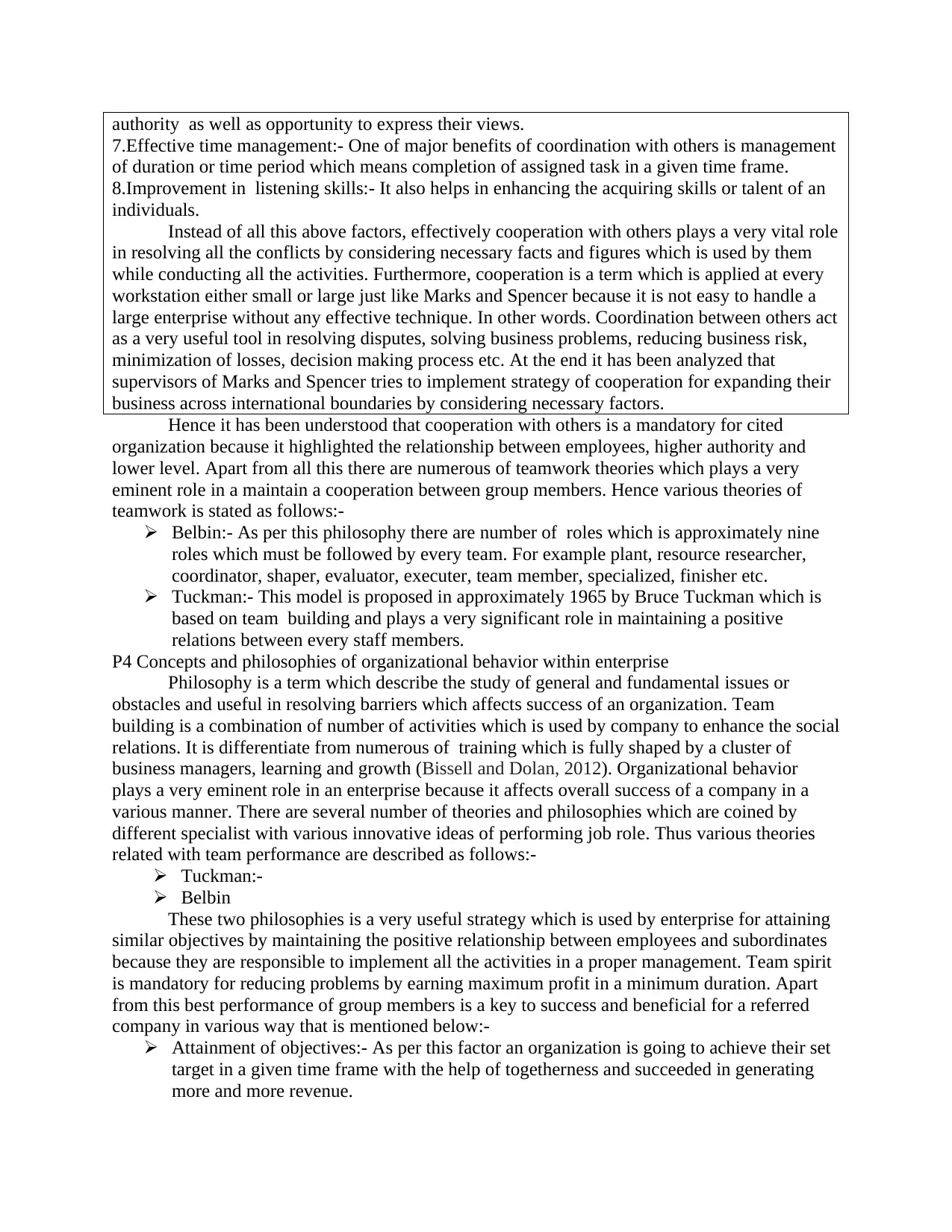
authority as well as opportunity to express their views.
7.Effective time management:- One of major benefits of coordination with others is management
of duration or time period which means completion of assigned task in a given time frame.
8.Improvement in listening skills:- It also helps in enhancing the acquiring skills or talent of an
individuals.
Instead of all this above factors, effectively cooperation with others plays a very vital role
in resolving all the conflicts by considering necessary facts and figures which is used by them
while conducting all the activities. Furthermore, cooperation is a term which is applied at every
workstation either small or large just like Marks and Spencer because it is not easy to handle a
large enterprise without any effective technique. In other words. Coordination between others act
as a very useful tool in resolving disputes, solving business problems, reducing business risk,
minimization of losses, decision making process etc. At the end it has been analyzed that
supervisors of Marks and Spencer tries to implement strategy of cooperation for expanding their
business across international boundaries by considering necessary factors.
Hence it has been understood that cooperation with others is a mandatory for cited
organization because it highlighted the relationship between employees, higher authority and
lower level. Apart from all this there are numerous of teamwork theories which plays a very
eminent role in a maintain a cooperation between group members. Hence various theories of
teamwork is stated as follows:-
Belbin:- As per this philosophy there are number of roles which is approximately nine
roles which must be followed by every team. For example plant, resource researcher,
coordinator, shaper, evaluator, executer, team member, specialized, finisher etc.
Tuckman:- This model is proposed in approximately 1965 by Bruce Tuckman which is
based on team building and plays a very significant role in maintaining a positive
relations between every staff members.
P4 Concepts and philosophies of organizational behavior within enterprise
Philosophy is a term which describe the study of general and fundamental issues or
obstacles and useful in resolving barriers which affects success of an organization. Team
building is a combination of number of activities which is used by company to enhance the social
relations. It is differentiate from numerous of training which is fully shaped by a cluster of
business managers, learning and growth (Bissell and Dolan, 2012). Organizational behavior
plays a very eminent role in an enterprise because it affects overall success of a company in a
various manner. There are several number of theories and philosophies which are coined by
different specialist with various innovative ideas of performing job role. Thus various theories
related with team performance are described as follows:-
Tuckman:-
Belbin
These two philosophies is a very useful strategy which is used by enterprise for attaining
similar objectives by maintaining the positive relationship between employees and subordinates
because they are responsible to implement all the activities in a proper management. Team spirit
is mandatory for reducing problems by earning maximum profit in a minimum duration. Apart
from this best performance of group members is a key to success and beneficial for a referred
company in various way that is mentioned below:-
Attainment of objectives:- As per this factor an organization is going to achieve their set
target in a given time frame with the help of togetherness and succeeded in generating
more and more revenue.
7.Effective time management:- One of major benefits of coordination with others is management
of duration or time period which means completion of assigned task in a given time frame.
8.Improvement in listening skills:- It also helps in enhancing the acquiring skills or talent of an
individuals.
Instead of all this above factors, effectively cooperation with others plays a very vital role
in resolving all the conflicts by considering necessary facts and figures which is used by them
while conducting all the activities. Furthermore, cooperation is a term which is applied at every
workstation either small or large just like Marks and Spencer because it is not easy to handle a
large enterprise without any effective technique. In other words. Coordination between others act
as a very useful tool in resolving disputes, solving business problems, reducing business risk,
minimization of losses, decision making process etc. At the end it has been analyzed that
supervisors of Marks and Spencer tries to implement strategy of cooperation for expanding their
business across international boundaries by considering necessary factors.
Hence it has been understood that cooperation with others is a mandatory for cited
organization because it highlighted the relationship between employees, higher authority and
lower level. Apart from all this there are numerous of teamwork theories which plays a very
eminent role in a maintain a cooperation between group members. Hence various theories of
teamwork is stated as follows:-
Belbin:- As per this philosophy there are number of roles which is approximately nine
roles which must be followed by every team. For example plant, resource researcher,
coordinator, shaper, evaluator, executer, team member, specialized, finisher etc.
Tuckman:- This model is proposed in approximately 1965 by Bruce Tuckman which is
based on team building and plays a very significant role in maintaining a positive
relations between every staff members.
P4 Concepts and philosophies of organizational behavior within enterprise
Philosophy is a term which describe the study of general and fundamental issues or
obstacles and useful in resolving barriers which affects success of an organization. Team
building is a combination of number of activities which is used by company to enhance the social
relations. It is differentiate from numerous of training which is fully shaped by a cluster of
business managers, learning and growth (Bissell and Dolan, 2012). Organizational behavior
plays a very eminent role in an enterprise because it affects overall success of a company in a
various manner. There are several number of theories and philosophies which are coined by
different specialist with various innovative ideas of performing job role. Thus various theories
related with team performance are described as follows:-
Tuckman:-
Belbin
These two philosophies is a very useful strategy which is used by enterprise for attaining
similar objectives by maintaining the positive relationship between employees and subordinates
because they are responsible to implement all the activities in a proper management. Team spirit
is mandatory for reducing problems by earning maximum profit in a minimum duration. Apart
from this best performance of group members is a key to success and beneficial for a referred
company in various way that is mentioned below:-
Attainment of objectives:- As per this factor an organization is going to achieve their set
target in a given time frame with the help of togetherness and succeeded in generating
more and more revenue.
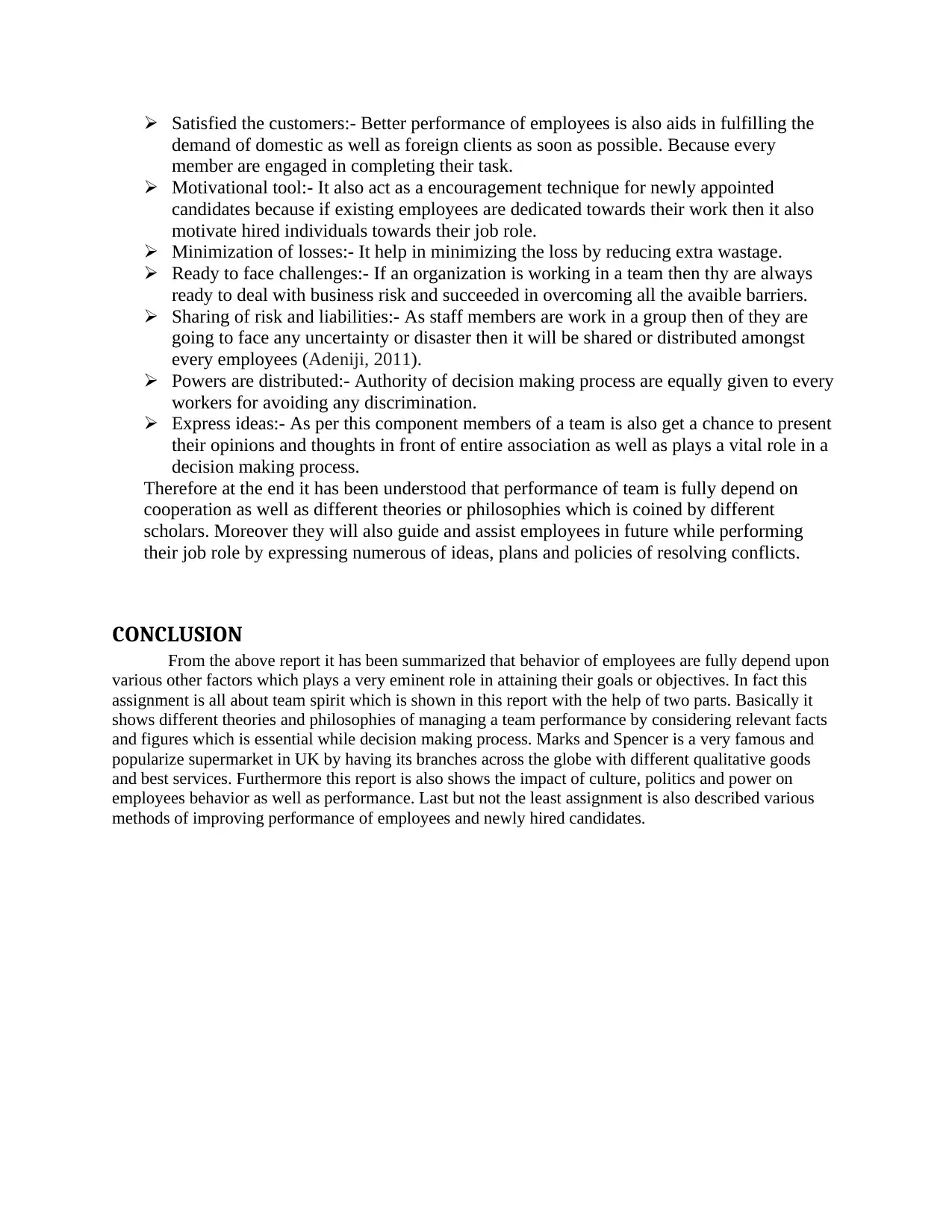
Satisfied the customers:- Better performance of employees is also aids in fulfilling the
demand of domestic as well as foreign clients as soon as possible. Because every
member are engaged in completing their task.
Motivational tool:- It also act as a encouragement technique for newly appointed
candidates because if existing employees are dedicated towards their work then it also
motivate hired individuals towards their job role.
Minimization of losses:- It help in minimizing the loss by reducing extra wastage.
Ready to face challenges:- If an organization is working in a team then thy are always
ready to deal with business risk and succeeded in overcoming all the avaible barriers.
Sharing of risk and liabilities:- As staff members are work in a group then of they are
going to face any uncertainty or disaster then it will be shared or distributed amongst
every employees (Adeniji, 2011).
Powers are distributed:- Authority of decision making process are equally given to every
workers for avoiding any discrimination.
Express ideas:- As per this component members of a team is also get a chance to present
their opinions and thoughts in front of entire association as well as plays a vital role in a
decision making process.
Therefore at the end it has been understood that performance of team is fully depend on
cooperation as well as different theories or philosophies which is coined by different
scholars. Moreover they will also guide and assist employees in future while performing
their job role by expressing numerous of ideas, plans and policies of resolving conflicts.
CONCLUSION
From the above report it has been summarized that behavior of employees are fully depend upon
various other factors which plays a very eminent role in attaining their goals or objectives. In fact this
assignment is all about team spirit which is shown in this report with the help of two parts. Basically it
shows different theories and philosophies of managing a team performance by considering relevant facts
and figures which is essential while decision making process. Marks and Spencer is a very famous and
popularize supermarket in UK by having its branches across the globe with different qualitative goods
and best services. Furthermore this report is also shows the impact of culture, politics and power on
employees behavior as well as performance. Last but not the least assignment is also described various
methods of improving performance of employees and newly hired candidates.
demand of domestic as well as foreign clients as soon as possible. Because every
member are engaged in completing their task.
Motivational tool:- It also act as a encouragement technique for newly appointed
candidates because if existing employees are dedicated towards their work then it also
motivate hired individuals towards their job role.
Minimization of losses:- It help in minimizing the loss by reducing extra wastage.
Ready to face challenges:- If an organization is working in a team then thy are always
ready to deal with business risk and succeeded in overcoming all the avaible barriers.
Sharing of risk and liabilities:- As staff members are work in a group then of they are
going to face any uncertainty or disaster then it will be shared or distributed amongst
every employees (Adeniji, 2011).
Powers are distributed:- Authority of decision making process are equally given to every
workers for avoiding any discrimination.
Express ideas:- As per this component members of a team is also get a chance to present
their opinions and thoughts in front of entire association as well as plays a vital role in a
decision making process.
Therefore at the end it has been understood that performance of team is fully depend on
cooperation as well as different theories or philosophies which is coined by different
scholars. Moreover they will also guide and assist employees in future while performing
their job role by expressing numerous of ideas, plans and policies of resolving conflicts.
CONCLUSION
From the above report it has been summarized that behavior of employees are fully depend upon
various other factors which plays a very eminent role in attaining their goals or objectives. In fact this
assignment is all about team spirit which is shown in this report with the help of two parts. Basically it
shows different theories and philosophies of managing a team performance by considering relevant facts
and figures which is essential while decision making process. Marks and Spencer is a very famous and
popularize supermarket in UK by having its branches across the globe with different qualitative goods
and best services. Furthermore this report is also shows the impact of culture, politics and power on
employees behavior as well as performance. Last but not the least assignment is also described various
methods of improving performance of employees and newly hired candidates.
⊘ This is a preview!⊘
Do you want full access?
Subscribe today to unlock all pages.

Trusted by 1+ million students worldwide
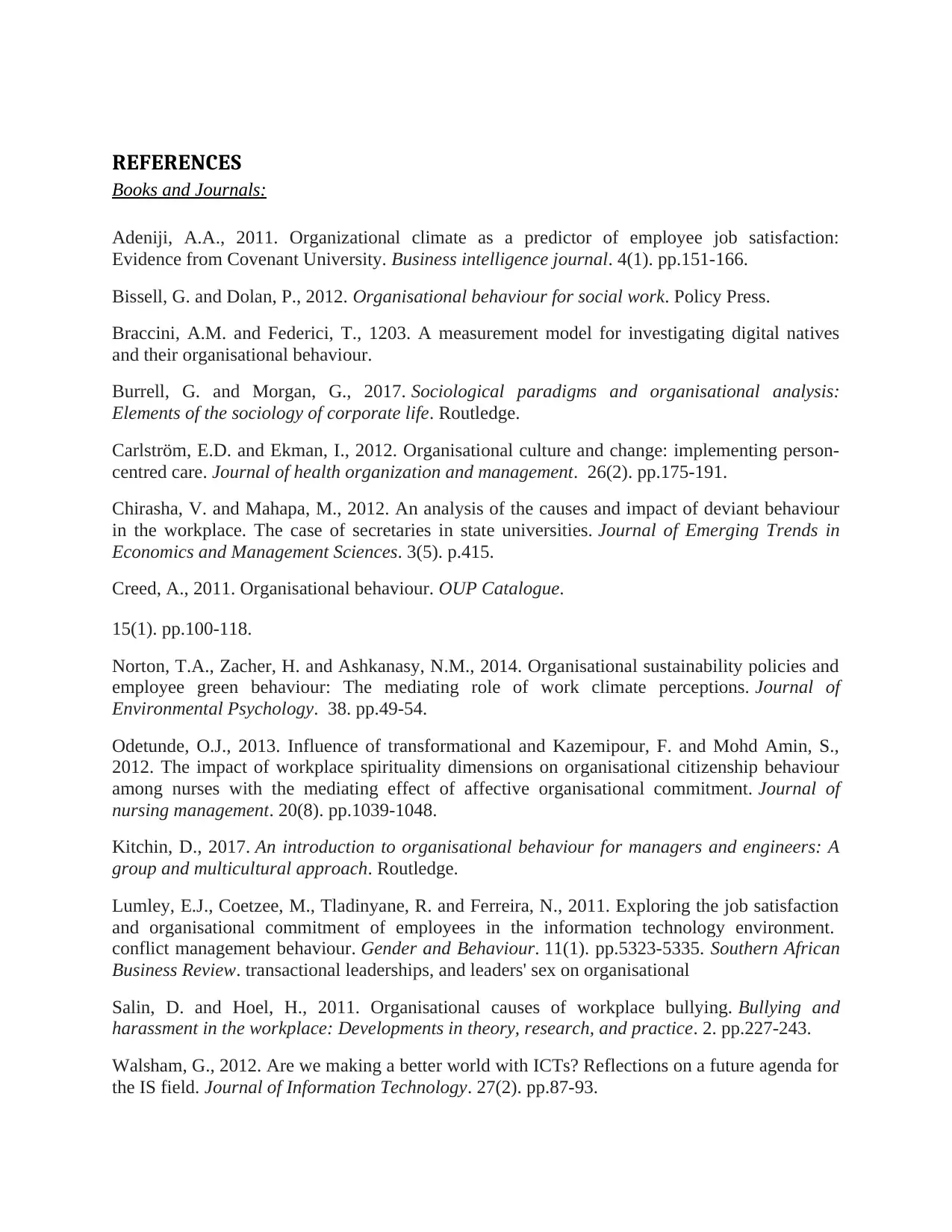
REFERENCES
Books and Journals:
Adeniji, A.A., 2011. Organizational climate as a predictor of employee job satisfaction:
Evidence from Covenant University. Business intelligence journal. 4(1). pp.151-166.
Bissell, G. and Dolan, P., 2012. Organisational behaviour for social work. Policy Press.
Braccini, A.M. and Federici, T., 1203. A measurement model for investigating digital natives
and their organisational behaviour.
Burrell, G. and Morgan, G., 2017. Sociological paradigms and organisational analysis:
Elements of the sociology of corporate life. Routledge.
Carlström, E.D. and Ekman, I., 2012. Organisational culture and change: implementing person-
centred care. Journal of health organization and management. 26(2). pp.175-191.
Chirasha, V. and Mahapa, M., 2012. An analysis of the causes and impact of deviant behaviour
in the workplace. The case of secretaries in state universities. Journal of Emerging Trends in
Economics and Management Sciences. 3(5). p.415.
Creed, A., 2011. Organisational behaviour. OUP Catalogue.
15(1). pp.100-118.
Norton, T.A., Zacher, H. and Ashkanasy, N.M., 2014. Organisational sustainability policies and
employee green behaviour: The mediating role of work climate perceptions. Journal of
Environmental Psychology. 38. pp.49-54.
Odetunde, O.J., 2013. Influence of transformational and Kazemipour, F. and Mohd Amin, S.,
2012. The impact of workplace spirituality dimensions on organisational citizenship behaviour
among nurses with the mediating effect of affective organisational commitment. Journal of
nursing management. 20(8). pp.1039-1048.
Kitchin, D., 2017. An introduction to organisational behaviour for managers and engineers: A
group and multicultural approach. Routledge.
Lumley, E.J., Coetzee, M., Tladinyane, R. and Ferreira, N., 2011. Exploring the job satisfaction
and organisational commitment of employees in the information technology environment.
conflict management behaviour. Gender and Behaviour. 11(1). pp.5323-5335. Southern African
Business Review. transactional leaderships, and leaders' sex on organisational
Salin, D. and Hoel, H., 2011. Organisational causes of workplace bullying. Bullying and
harassment in the workplace: Developments in theory, research, and practice. 2. pp.227-243.
Walsham, G., 2012. Are we making a better world with ICTs? Reflections on a future agenda for
the IS field. Journal of Information Technology. 27(2). pp.87-93.
Books and Journals:
Adeniji, A.A., 2011. Organizational climate as a predictor of employee job satisfaction:
Evidence from Covenant University. Business intelligence journal. 4(1). pp.151-166.
Bissell, G. and Dolan, P., 2012. Organisational behaviour for social work. Policy Press.
Braccini, A.M. and Federici, T., 1203. A measurement model for investigating digital natives
and their organisational behaviour.
Burrell, G. and Morgan, G., 2017. Sociological paradigms and organisational analysis:
Elements of the sociology of corporate life. Routledge.
Carlström, E.D. and Ekman, I., 2012. Organisational culture and change: implementing person-
centred care. Journal of health organization and management. 26(2). pp.175-191.
Chirasha, V. and Mahapa, M., 2012. An analysis of the causes and impact of deviant behaviour
in the workplace. The case of secretaries in state universities. Journal of Emerging Trends in
Economics and Management Sciences. 3(5). p.415.
Creed, A., 2011. Organisational behaviour. OUP Catalogue.
15(1). pp.100-118.
Norton, T.A., Zacher, H. and Ashkanasy, N.M., 2014. Organisational sustainability policies and
employee green behaviour: The mediating role of work climate perceptions. Journal of
Environmental Psychology. 38. pp.49-54.
Odetunde, O.J., 2013. Influence of transformational and Kazemipour, F. and Mohd Amin, S.,
2012. The impact of workplace spirituality dimensions on organisational citizenship behaviour
among nurses with the mediating effect of affective organisational commitment. Journal of
nursing management. 20(8). pp.1039-1048.
Kitchin, D., 2017. An introduction to organisational behaviour for managers and engineers: A
group and multicultural approach. Routledge.
Lumley, E.J., Coetzee, M., Tladinyane, R. and Ferreira, N., 2011. Exploring the job satisfaction
and organisational commitment of employees in the information technology environment.
conflict management behaviour. Gender and Behaviour. 11(1). pp.5323-5335. Southern African
Business Review. transactional leaderships, and leaders' sex on organisational
Salin, D. and Hoel, H., 2011. Organisational causes of workplace bullying. Bullying and
harassment in the workplace: Developments in theory, research, and practice. 2. pp.227-243.
Walsham, G., 2012. Are we making a better world with ICTs? Reflections on a future agenda for
the IS field. Journal of Information Technology. 27(2). pp.87-93.
Paraphrase This Document
Need a fresh take? Get an instant paraphrase of this document with our AI Paraphraser
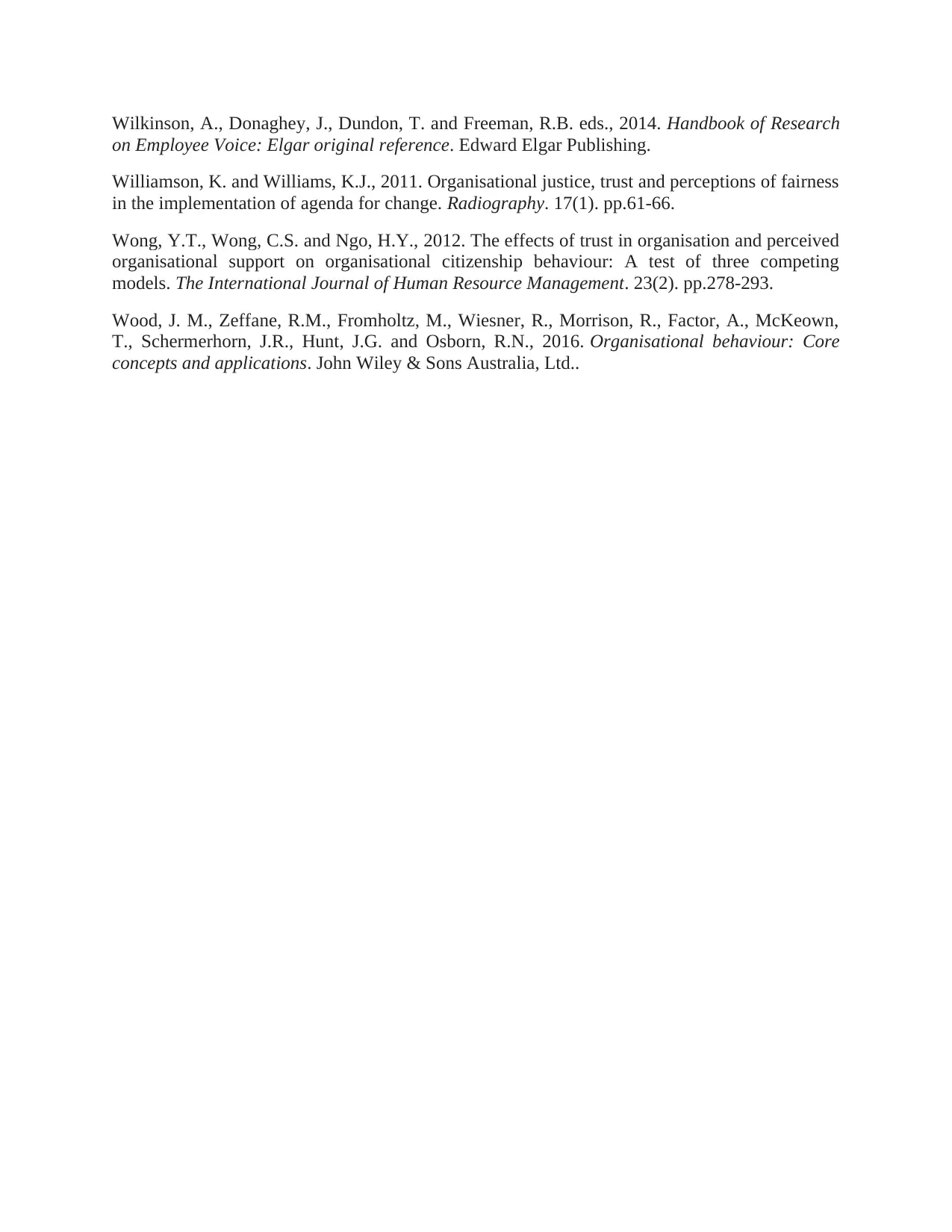
Wilkinson, A., Donaghey, J., Dundon, T. and Freeman, R.B. eds., 2014. Handbook of Research
on Employee Voice: Elgar original reference. Edward Elgar Publishing.
Williamson, K. and Williams, K.J., 2011. Organisational justice, trust and perceptions of fairness
in the implementation of agenda for change. Radiography. 17(1). pp.61-66.
Wong, Y.T., Wong, C.S. and Ngo, H.Y., 2012. The effects of trust in organisation and perceived
organisational support on organisational citizenship behaviour: A test of three competing
models. The International Journal of Human Resource Management. 23(2). pp.278-293.
Wood, J. M., Zeffane, R.M., Fromholtz, M., Wiesner, R., Morrison, R., Factor, A., McKeown,
T., Schermerhorn, J.R., Hunt, J.G. and Osborn, R.N., 2016. Organisational behaviour: Core
concepts and applications. John Wiley & Sons Australia, Ltd..
on Employee Voice: Elgar original reference. Edward Elgar Publishing.
Williamson, K. and Williams, K.J., 2011. Organisational justice, trust and perceptions of fairness
in the implementation of agenda for change. Radiography. 17(1). pp.61-66.
Wong, Y.T., Wong, C.S. and Ngo, H.Y., 2012. The effects of trust in organisation and perceived
organisational support on organisational citizenship behaviour: A test of three competing
models. The International Journal of Human Resource Management. 23(2). pp.278-293.
Wood, J. M., Zeffane, R.M., Fromholtz, M., Wiesner, R., Morrison, R., Factor, A., McKeown,
T., Schermerhorn, J.R., Hunt, J.G. and Osborn, R.N., 2016. Organisational behaviour: Core
concepts and applications. John Wiley & Sons Australia, Ltd..
1 out of 11
Related Documents
Your All-in-One AI-Powered Toolkit for Academic Success.
+13062052269
info@desklib.com
Available 24*7 on WhatsApp / Email
![[object Object]](/_next/static/media/star-bottom.7253800d.svg)
Unlock your academic potential
Copyright © 2020–2026 A2Z Services. All Rights Reserved. Developed and managed by ZUCOL.





